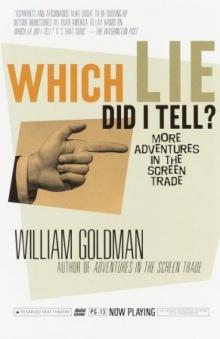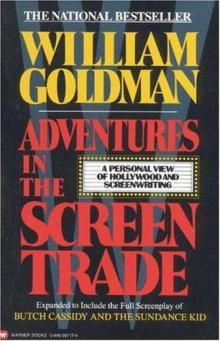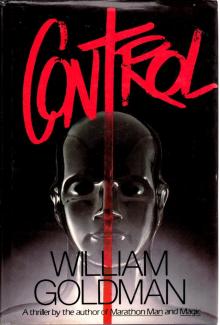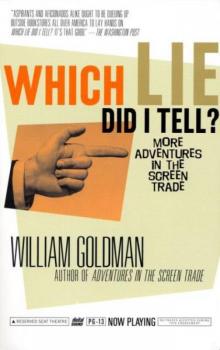- Home
- William Goldman
Adventures in the Screen Trade Page 5
Adventures in the Screen Trade Read online
Page 5
Which is why I truly believe that if all you do with your life is write screenplays, it ultimately has to denigrate the soul. You may get lucky and get rich, but you sure won't get happy. Because you will spend your always-decreasing days doing the following: writing Perfect Parts for Perfect People.
And there's got to be more to the human condition than that....
Studio Executives
Studio executives are intelligent, brutally overworked men and women who share one thing in common with baseball managers: They wake up every morning of the world with the knowledge that sooner or later they're going to get fired.
In the old days of the great studios, this situation didn't exist. The Harry Cohns and the Louis Mayers fully expected to be in their traces till they dropped. Their modern counterparts are under a totally different system: They must get results--now--or they're gone. There is perhaps more executive shuffling in any single year now than existed in the entirety of the nineteen thirties or forties.
And with this pressure always on them, always mounting, each "go" decision they make becomes excruciating--one of the reasons why, right now, no one in Hollywood wants to make movies. (As of June, 1982, film starts were down exactly fifty percent from a year ago.)
The "go" decision is the ultimate importance of the studio executive. They are responsible for what gets up there on the silver screen. Compounding their problem of no job security in the decision-making process is the single most important fact, perhaps, of the entire movie industry:
NOBODY KNOWS ANYTHING.
If there is a Roman numeral I to this book, that's it. (Actually, there are two Roman numeral I's to this book, but I won't get to the second until the chapter on Butch Cassidy and the Sundance Kid.)
Again, for emphasis--
NOBODY KNOWS ANYTHING.
Not one person in the entire motion picture field knows for a certainty what's going to work. Every time out it's a guess--and, if you're lucky, an educated one.
They don't know when the movie is finished: B. J. Thomas's people, after the first sneak of Butch, were upset about their client's getting involved with the song "Raindrops Keep Fallin' on My Head." One of them was heard to say, more than once, "B. J. really hurt himself with this one."
The initial preview of Star! was such a success that Richard Zanuck cancelled any further previews and sent a wire to his father, Darryl, that said, "We're home. Better than Sound of Music."
The Sound of Music was then the most popular movie in history, and Star! went on to become the Edsel of 20th Century-Fox: No matter how they readvertised it or changed the logo or the title, no one came. And Richard Zanuck has as keen a mind about commercial films as anyone.
They don't know when the movie is starting to shoot either. David Brown, Zanuck's partner, has said, "We didn't know whether Jaws would work, but we didn't have any doubts about The Island. It had to be a smash. Everything worked. The screenplay worked. Every actor we sent it to said yes. I didn't know until a few days after we opened and I was in a bookstore and I ran into Lew Wasserman and said 'How're we doing?' and he said, 'David, they don't want to see the picture.' "
They don't want to see the picture--maybe the most chilling phrase in the industry.
Now, if the best people around don't know at sneaks, and they don't know during shooting, you better believe that executives don't know when they're trying to give a thumbs-up or-down; they're trying to predict public taste three years ahead and it's just not possible.
Obviously, I'm asking you to take my word on this and there's no reason really that you should, because pictures such as Raiders of the Lost Ark probably come to mind. Which, I grant, was an unusual film.
Raiders is the number-four film in history as this is being written. I don't remember any movie that had such power going in. It was more or less the brainchild of George Lucas and was directed by Steven Spielberg, the two unquestioned wunderkinder of show business (Star Wars, Jaws, etc.). Probably you all knew that. But did you know that Raiders of the Lost Ark was offered to every single studio in town--
--and they all turned it down?
All except Paramount.
Why did Paramount say yes? Because nobody knows anything. And why did all the other studios say no? Because nobody knows anything. And why did Universal, the mightiest studio of all, pass on Star Wars, a decision that just may cost them, when all the sequels and spinoffs and toy money and book money and video-game money are totaled, over a billion dollars? Because nobody, nobody--not now, not ever--knows the least goddam thing about what is or isn't going to work at the box office.
One additional anguish executives must cope with is that hot streaks don't last. A recent newspaper article mentioned how the other studios were gloating over what was happening at Columbia.
Columbia had been sizzling, but then Annie went wildly over budget. And an expensive action film wouldn't cut together coherently. And everybody knew that the set of Tootsie was not where you wanted to spend your summer vacation.
And they had passed on E. T.
Columbia had had it, developed it for a million dollars, took a survey, and discovered the audience for the movie would be too limited to make it profitable. So they let it go. (Universal picked it up and may make back the billion they didn't earn by dropping Star Wars.)
David Picker, a fine studio executive for many years, once said something to this effect: "If I had said yes to all the projects I turned down, and no to all the ones I took, it would have worked out about the same."
In any case, do not send to know why studio executives have insomnia. It goes with the territory....
WHO ARE STUDIO EXECUTIVES?
Mostly, today, they are agents.
Ex-agents, more accurately. And a lot of people interviewed for this book feel that that accounts, more than any single thing, for Hollywood's present plight. I'm not at all sure I agree with the conclusion, but I can summarize the wisdom behind it.
Let's begin with some agent jokes; there are always agent jokes in Hollywood and the most recent ones I've heard are these: A patient goes to see a surgeon about having a heart transplant. The surgeon says, "I'll give you a choice: You can either have the heart of a twenty-five-year-old marathon runner or a sixty-year-old agent, which do you want?" And the patient answers, "Easy--let me have the agent's." And the surgeon, dumbfounded, says, "Why would you pick the heart of a sixty-year-old agent over a twenty-five-year-old marathon runner?" And the patient replies, "I want one that's never been used."
Or this one: An agent and a bunch of other passengers are on a boat in dangerous waters and the agent falls overboard, and before anyone can do anything this giant shark comes swimming up, and when the shark is six feet away he veers off and swims in another direction, and one of the passengers says, "Did you see that, did you see what just happened, it's an act of God," and another passenger answers, "That wasn't an act of God, it was professional courtesy."
All agent jokes are based on that same premise: Agents are not noted for human kindness. Now, in point of fact, this is not true. (I'm serious.) Most of the major agents I've come in contact with are decent human beings.
But probably one can make a certain valid generalization about agents, and it's this: Their primary interest is not in the art object but in the deal. That's not criticism, that's basic logic--if a man makes his living off ten percent of his client's earnings, the more those earnings, the more meaningful his percentage. That's his job. As an agent.
But it's not his job when he changes hats.
Agents become studio heads primarily for one reason: No one else will undertake the occupation. It's terrible work. It's seven days a week, it's mornings and evenings, it's getting killed by agents who are still agents. It's escalating costs, it's getting killed by their boards of directors, who are screaming that costs are too high.
So why do agents accept the responsibility? Because, in many ways, it's better than being an agent. There's more power and generally there's more
money.
So we've got an ex-agent running our studio. What can we say about him? A lot of good things. He's hardworking. He's shrewd as hell. He's got a lot of contacts in the business. He understands a great deal about how the business operates.
What he doesn't understand, generally speaking, is passion.
Just as in the old days, when he didn't care about the film as much as the deal, the same holds true now. He never, most likely, has worked on a film, never written one or produced one, most certainly never directed one. People are coming at him day and night with projects--"I must make this. You must give me my chance." The agent, being unused to working this side of the street, seeks help from two sources: (1) stars, because he understands them from his earlier life, and (2) the business end of the studio, the people who handle the selling of films. Because they never cared about passion, and because they, at least in theory, know what will sell and what won't. (We know that's not true, and the business people do, too, but obviously if they admit it, they get drummed from the corps; my God, what are business people for if they don't know.)
Business people do know one thing: what they can book into theatres in advance. Theatre owners often don't see the product they're buying until it's too late, so if they are given a choice between a Steve Martin musical and a movie about two English guys running in the 1924 Olympics, logic dictates which way they swing.
I think it's safe to say that today, more than ever in Hollywood history, the business types hold sway. They are kept in close touch on every conceivable project that the studio may contemplate. And what they say matters. Matters crucially. In the old days, a studio head might have said, "Let's make the goddam movie and hope the business guys know how to sell it."
Such words are not much uttered nowadays....
THE THREE S's
Hollywood has always been a caste-system town. An ancient survivor told me: "When I was a fifteen-hundred-a-week writer, it was understood I didn't associate with another guy who only got seven-fifty. And the twenty-five-hundred-dollar guys didn't want me contaminating them. And it's the same with the other jobs--top directors knew top directors, big stars didn't pal around with unknowns. Oh, maybe they'd keep them as gofers, but when it was a heavy social situation that needed attending, the gofers were gone."
Of course this holds true with studio executives. They tend to know each other--they may have worked at the same agencies at the same time. And naturally, they are all competitive, one with the other. Out of this situation comes their reliance on stars. And that need can be divided into thirds, which can be called the three S's.
S Number One: Social
This is more than one executive or his wife being able to say, casually, "Just made a two-picture deal with Burt." Or "Clint just signed on, we go in April." This is important in and of itself. If you've got nobody to talk about, it can make for grim going at a cocktail party.
A deeper need for parity comes not from individual social needs but from those of a studio itself.
One example: When the Arthur Krim group left United Artists to form Orion, there were rumors all around the industry that the new United Artists people weren't in the big time anymore. This was dangerous to United Artists because it meant that major "elements"--stars, directors, producers--might avoid going to UA with their projects. (Studios rarely initiate projects anymore. A package of sorts will be put together and brought to them and they will decide whether to put up the money. This abdication of what was once the essential role of the studio is as big a change as any in Hollywood.)
Anyway, here's UA, shunned and forlorn. So what did they do? They bought, for the record-breaking sum of two and a half million dollars, Gay Talese's sex book, Thy Neighbor's Wife. There was great publicity and the studio announced they would make not one but two major films out of the material. (They have made, to this date, a grand total of none and things seem likely to stay that way.)
Now, the thing that made the Talese buy remarkable wasn't just the incredible sum. The book was famous long before publication, and the logical assumption would be, to grab such a property at such a price, you have to outbid competition. I mean, the reason you pay two million five has got to be that someone else bid two million four.
Well, the rumor around town was that nobody else bid anything for the Talese.
UA paid that amount for two reasons: The first, obviously, was to acquire the property. But the most important was the second: They were announcing to the Hollywood community, "Hey, we're still here." Probably they could have bought the book for half or less than half of what they spent. But that wouldn't have served their purpose--they needed to blow the money. It served to put them back up there with their peers.
A sadder example of this social need for equality was a move the Orion people made. They also had to prove they were still heavyweights, so they made a zillion deals. Including one where they gave John Travolta control of any movies he did for them. Travolta was then maybe twenty-five with two leads behind him. Giving someone with that lack of track record control only betrayed Orion's desperation. Which was sad, at least for me, because they were, when at UA, maybe the top group in the business. But maybe it was worth it to them, since they could then say, "Look, everybody, we've got John Travolta."
S Number Two: Shorthand
It speeds things up when you have stars. If you say, "We're doing a Goldie Hawn picture," you don't have to go on. The performer sets the framework of the product. If you say you've got Chariots of Fire, you're going to have to go on and on explicating just what it is that you're talking about.
This shorthand is especially helpful to the business people at the studio.
This past holiday season, UA had four pictures out in the marketplace. (A different UA group, by the by, than the people who bought the Talese book--who'd come and quickly gone.) It was a tremendous lineup and quickly describable: "We've got Peter Falk in a raunchy comedy, Richard Dreyfuss in a Broadway smash, Lemmon and Matthau together again with Billy Wilder, and Steve Martin in a musical."
It's no wonder with product like that, they were able to get fabulous bookings in the best theatres all around the country. And with those fabulous bookings what did they achieve? The four films--All the Marbles, Whose Life Is It Anyway?, Buddy, Buddy, and Pennies from Heaven--probably lost a minimum of fifty million dollars, maybe as much as seventy-five.
But they got booked in theatres. Which is the name of the game for the business people at the studios. Should we be surprised at the theatre owners grabbing those movies? Of course not, they'd have been out of their gourds not to. Should we be surprised at the failures of the films? A very faint maybe. Clearly, this is hindsight, which never fails. And again, nobody ever knows. But each of these films had a giant problem attached. Let's take them in the order in which they opened.
The Peter Falk film, All the Marbles. In description it still sounds terrific. It's a raunchy comedy in which Falk plays the manager of two gorgeous girls who are tag-team wrestling partners. It takes place, for the most part, in raunchy tank towns, with Falk always the hustler. And no one plays that kind of sleazy character better than Peter Falk.
The problem: The movie takes pro wrestling seriously. We know that when Bruno Sammartino enters the ring, he's pretty much a shoo-in. He may get pounded, he may be beaten almost senseless. But one way or another, he's going to triumph. Whether pro wrestling is actually rehearsed or not, I have no idea. But the outcome is not in doubt.
All the Marbles treated each match as if it were the pro football playoffs leading toward the Superbowl. The matches, we were asked to believe, weren't fixed or phony, any more than the seventh game of the World Series. Would an audience buy that premise? When I saw the movie they sure didn't.
The Richard Dreyfuss film, Whose Life Is It Anyway? This was certainly a famous show on Broadway: Tom Conti won the Tony for his performance, and then, with tremendous publicity, Mary Tyler Moore took over the part, for which she was also awarded. But it was never m
uch of a commercial hit. I don't think it ever had a single sellout week. It was well reviewed--as was the movie--but perhaps the problem was the subject matter.
Whose Life deals with a young sculptor who is totally crippled in an auto accident. He's incapable of moving from the neck down. And the story is that of his right to have himself killed. Coming Home dealt with a cripple, too, and it did business. But it was a romance. And no matter how the ads for Whose Life tried to sell you that it was about life, it wasn't. The ads on F.I.S.T. tried to tell us it wasn't a story of a labor union organizer but about a man. But hey, that man was a labor union organizer. And Whose Life dealt with death. Would the audience want to see such subject matter? Maybe treated as a fantasy--Heaven Can Wait--but treated realistically? They never have.
The Lemmon/Matthau/Billy Wilder comedy. Buddy, Buddy. Lemmon and Matthau have proved a superb comedy team, most successfully in The Odd Couple back in '68, And Billy Wilder? Unquestionably one of the great directors and one who is most skilled at comedic material. In one half-decade, his comedies included Sabrina, The Seven Year Itch, Some Like It Hot, and The Apartment. But his last major success was Irma la Douce, and that in 1963. Problem: Could their commercial skills be resurrected? Alas, they could not.
The Steve Martin musical, Pennies from Heaven. Martin is a cult figure for young people, and his only previous movie, The Jerk, was one of the most successful comedies ever. Martin and Richard Pryor I would think are the top two young comics in the business.
But Pennies from Heaven was a musical. And it wasn't meant primarily to be funny. Set in the Depression, Martin played a down-and-out song plugger who eventually gets sent up for murder. The actors simply mouthed all the songs: The actual voices were real records of the Depression era.
So the emphasis on the musical numbers fell, naturally enough, on the dances. And the simple fact is that Steve Martin isn't much of a dancer. Oh, he tried, he executed steps, he obviously worked his buns off learning to be a hoofer. But it was a case of the dancing bear--it's not that he does it well but that he can do it at all. For the truth is, there has never been a Broadway musical in the history of the world for which Steve Martin would have been good enough to get cast in the chorus.

 The Princess Bride
The Princess Bride The Temple of Gold
The Temple of Gold Which Lie Did I Tell?: More Adventures in the Screen Trade
Which Lie Did I Tell?: More Adventures in the Screen Trade Adventures in the Screen Trade
Adventures in the Screen Trade Marathon Man
Marathon Man The Novels of William Goldman: Boys and Girls Together, Marathon Man, and the Temple of Gold
The Novels of William Goldman: Boys and Girls Together, Marathon Man, and the Temple of Gold Boys and Girls Together: A Novel
Boys and Girls Together: A Novel Control
Control The Novels of William Goldman
The Novels of William Goldman Which Lie Did I Tell?
Which Lie Did I Tell? Boys & Girls Together
Boys & Girls Together